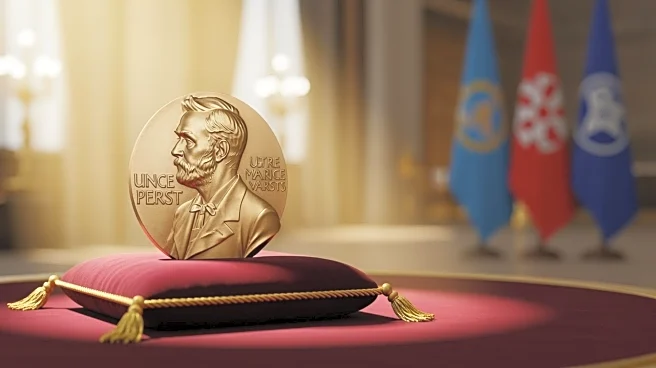What's Happening?
Supporters of President Trump are lobbying for him to receive the Nobel Peace Prize in 2026, following his efforts to broker a ceasefire in the Middle East. The Nobel committee's decision may hinge on perceptions of Trump's humanitarian aid policies and
his approach to American citizens. Historically, U.S. presidents who have received the Nobel Peace Prize, such as Jimmy Carter and Barack Obama, have used their acceptance speeches to address the complexities of war and peace. These speeches often reflect on the ongoing struggles and the moral challenges involved in peace-building efforts. The committee values speeches that honor the solemnity of the occasion and articulate a vision of peace, justice, and human dignity.
Why It's Important?
The potential awarding of the Nobel Peace Prize to President Trump could have significant implications for U.S. diplomacy and international relations. It would highlight Trump's role in Middle East peace efforts and could influence perceptions of his presidency globally. The Nobel committee's decision will also reflect on the importance of rhetorical decorum and the moral standards expected of laureates. Acceptance speeches serve as platforms for leaders to address global issues and inspire future generations. The committee's focus on the dignity and humility of the speeches underscores the importance of thoughtful reflection in international diplomacy.
What's Next?
If President Trump is awarded the Nobel Peace Prize, his acceptance speech will be closely scrutinized for its adherence to the committee's expectations of dignity and thoughtful reflection. The speech could serve as an opportunity for Trump to articulate his vision for peace and address the ongoing tensions between war and diplomacy. The committee will likely expect a unifying message that speaks to both current and future generations, emphasizing shared humanity over division. The decision could also impact Trump's legacy and influence future diplomatic efforts.
Beyond the Headlines
The awarding of the Nobel Peace Prize to President Trump could spark debates about the role of rhetoric in peace-building and the ethical considerations of awarding such honors to controversial figures. It may also prompt discussions on the balance between conflict resolution and humanitarian aid policies. The committee's decision will reflect broader cultural and ethical dimensions of peace efforts, highlighting the importance of moral leadership in addressing global challenges.
















